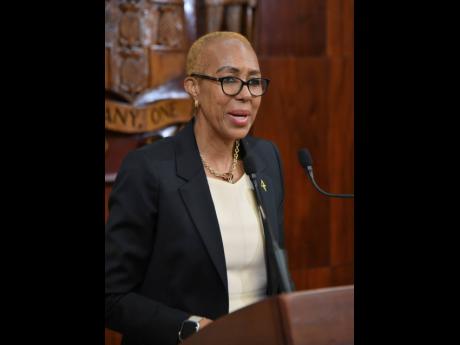JTA wary as school starts with math, English teachers in short supply
Education minister promises Jamaica ‘at threshold of a new era’
Several schools are set to start the new school term with vacancies in critical areas. This despite Education Minister Fayval Williams’ assurances to the island that there are enough “high quality” teachers left in the system amid the ongoing teacher-migration crisis.
Williams recently disclosed that 854 teachers have resigned from public schools since the start of the year. For the previous school year, 1,538 teachers resigned.
Since 2020, teacher migration has heightened and has become a recurring problem for the sector as more teachers accept more lucrative offers overseas to create a better life for themselves and their families.
However, Williams, while addressing the nation last night ahead of the start of the new school year, sought to put school administrators’ minds at ease.
“We know that there may be some lingering unease about the number of teachers who have left the system, but I want to assure Jamaicans that there are enough high-quality teachers available to support the teaching and learning process at the highest standards,” she said.
But newly installed Jamaica Teachers’ Association President Leighton Johnson said that while there is not necessarily a shortage of senior or high-quality teachers, several schools are scurrying to fill critical areas.”
“The situation that currently exists right now is that there are schools that will begin the new school year and are unable to fulfill critical vacancies.
“There are critical areas such as maths, English and in some technical disciplines. Those areas are in very short supply as we speak,” Johnson revealed.
In the meantime, he said the association was awaiting the start of the new school year to assess the full impact of the migration issue.
Weighing in on the issue, Linval Wright, president of the Jamaica Association of Principals of Secondary Schools, said that while there are still high-quality teachers left in the system, more seasoned educators have left the sector.
“In critical areas such as English and industrial arts, schools will have to work through how best to prepare the students with the experience missing,” he said.
But at the same time, Wright said the situation may be an opportunity to showcase the abilities of the newer teachers who, in some instances, “will do as good or even a better job than those who have let”.
Nevertheless, he said, “Migration will definitely affect the quality as many who left were seasoned and knew the ropes well.”
Williams, in her broadcast, also highlighted that this year’s focus would be on transforming the education system.
“Our theme for this year is ‘Transforming, Reforming ... Moving Forward’, which represents not just the start of a school year, but also signals the serious transformation that we expect will shape the future of education,” she said.
Added the minister, “We are at the threshold of an era where change is not merely a concept but a living reality. Our dedication to revitalising and invigorating the landscape remains steadfast.”
Pointing to the Transformation in Education for National Development Programme, she explained that it is more than just a series of policies. “It embodies a shared vision for progress, a commitment to excellence and an investment in the boundless potential of our students.”
While expressing optimism and excitement about the new direction, Williams said several meetings had already been convened with different stakeholders to plan and develop strategies for the best outcomes.
“We are ready to empower our students for success in an ever-evolving world.
“With renewed determination, we embark on this transformative path, embracing change and reform to shape a brighter future for our youth. Let us move forward together, equipping our students with the tools they need to excel and contribute meaningfully to society,” the minister declared.
Noting that the education transformation journey is designed specifically for students, she assured them that “we are creating an environment where innovation and creativity thrive; where learning extends beyond textbooks to encompass the world around you.”
Turning to the teachers and principals, Williams underscored that they have a crucial role to play in the transformation.
“Your dedication is the foundation for a future for our students and the growth and prosperity of this nation. Our reforms acknowledge the difficulties you face and aim to equip you with the tools, resources, and opportunities that you truly deserve,” she said.
Acknowledging also that parents are a valuable partner in the transformation journey, she encouraged them to stay engaged, communicate openly, and support their children’s pursuits.
Johnson, in welcoming the focus on transformation, said areas such as safety and security and finance required urgent attention.
“Since 2017, schools have been given $17,000 or $19,000 per student at the high-school level and $2,500 per student at the primary level. We have to seriously speak about how schools are financed when we are speaking about transformation in education as the funding is woefully inadequate in comparison to other jurisdictions,” he said.
Another area that needs to be looked at immediately, Johnson said, is making the profession attractive. Currently, he said the teachers’ colleges are woefully undersubscribed and a national campaign is required to get the colleges populated to meet teaching demands.
In the meantime, National Parent-Teacher Association of Jamaica President Stewart Jacobs, in his back-to-school message, called for the authorities to urgently address the issues of safety and security, transportation, teacher retention, and nutrition to ensure a successful academic year.
Among the recommendations offered by the association in addressing the problems, specifically with regard to teacher retention, is for the Government to reconsider the current remuneration packages; have a dialogue with the overseas recruiters with a view to agreeing on a quota system; consider term limits for overseas employment; re-engage retired teachers, with attractive offerings; and move to virtual learning to widen the student-teacher contact environment.

